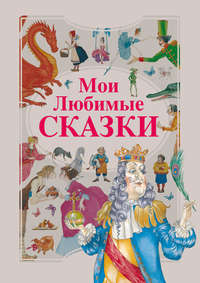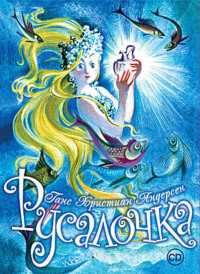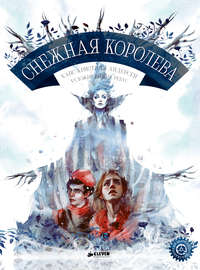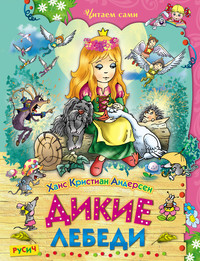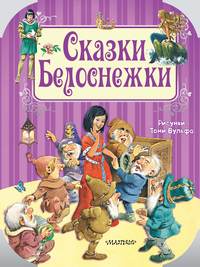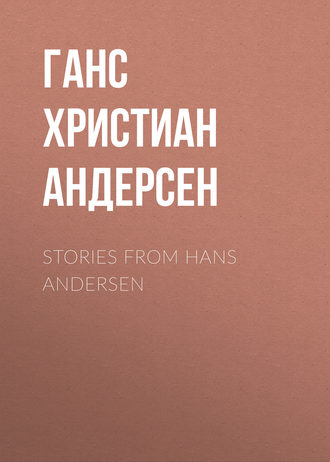 полная версия
полная версияStories from Hans Andersen
'Oh, my poor old grandmother!' sighed Gerda. 'She will be longing to see me, and grieving about me, as she did about Kay. But I shall soon go home again and take Kay with me. It is useless for me to ask the flowers about him. They only know their own stories, and have no information to give me.'
Then she tucked up her little dress, so that she might run the faster; but the narcissus blossoms struck her on the legs as she jumped over them, so she stopped and said, 'Perhaps you can tell me something.'
She stooped down close to the flower and listened. What did it say?
'I can see myself, I can see myself,' said the narcissus. 'Oh, how sweet is my scent. Up there in an attic window stands a little dancing girl half dressed; first she stands on one leg, then on the other, and looks as if she would tread the whole world under her feet. She is only a delusion. She pours some water out of a teapot on to a bit of stuff that she is holding; it is her bodice. "Cleanliness is a good thing," she says. Her white dress hangs on a peg; it has been washed in the teapot, too, and dried on the roof. She puts it on, and wraps a saffron-coloured scarf round her neck, which makes the dress look whiter. See how high she carries her head, and all upon one stem. I see myself, I see myself!'
'I don't care a bit about all that,' said Gerda; 'it's no use telling me such stuff.'
And then she ran to the end of the garden. The door was fastened, but she pressed the rusty latch, and it gave way. The door sprang open, and little Gerda ran out with bare feet into the wide world. She looked back three times, but nobody came after her. At last she could run no further, and she sat down on a big stone. When she looked round she saw that the summer was over; it was quite late autumn. She would never have known it inside the beautiful garden, where the sun always shone, and the flowers of every season were always in bloom.
'Oh, how I have wasted my time,' said little Gerda. 'It is autumn. I must not rest any longer,' and she got up to go on.
Oh, how weary and sore were her little feet, and everything round looked so cold and dreary. The long willow leaves were quite yellow. The damp mist fell off the trees like rain, one leaf dropped after another from the trees, and only the sloe-thorn still bore its fruit; but the sloes were sour and set one's teeth on edge. Oh, how grey and sad it looked, out in the wide world.
FOURTH STORY
PRINCE AND PRINCESS
Gerda was soon obliged to rest again. A big crow hopped on to the snow, just in front of her. It had been sitting looking at her for a long time and wagging its head. Now it said, 'Caw, caw; good-day, good-day,' as well as it could; it meant to be kind to the little girl, and asked her where she was going, alone in the wide world.
Gerda understood the word 'alone' and knew how much there was in it, and she told the crow the whole story of her life and adventures, and asked if it had seen Kay.
The crow nodded its head gravely and said, 'May be I have, may be I have.'
'What, do you really think you have?' cried the little girl, nearly smothering him with her kisses.
'Gently, gently!' said the crow. 'I believe it may have been Kay, but he has forgotten you by this time, I expect, for the Princess.'
'Does he live with a Princess?' asked Gerda.
'Yes, listen,' said the crow; 'but it is so difficult to speak your language. If you understand "crow's language,"1 I can tell you about it much better.'
'No, I have never learnt it,' said Gerda; 'but grandmother knew it, and used to speak it. If only I had learnt it!'
'It doesn't matter,' said the crow. 'I will tell you as well as I can, although I may do it rather badly.'
Then he told her what he had heard.
'In this kingdom where we are now,' said he, 'there lives a Princess who is very clever. She has read all the newspapers in the world, and forgotten them again, so clever is she. One day she was sitting on her throne, which is not such an amusing thing to do either, they say; and she began humming a tune, which happened to be
"Why should I not be married, oh why?""Why not indeed?" said she. And she made up her mind to marry, if she could find a husband who had an answer ready when a question was put to him. She called all the court ladies together, and when they heard what she wanted they were delighted.
'"I like that now," they said. "I was thinking the same thing myself the other day."
'Every word I say is true,' said the crow, 'for I have a tame sweetheart who goes about the palace whenever she likes. She told me the whole story.'
Of course his sweetheart was a crow, for 'birds of a feather flock together,' and one crow always chooses another. The newspapers all came out immediately with borders of hearts and the Princess's initials. They gave notice that any young man who was handsome enough might go up to the Palace to speak to the Princess. The one who spoke as if he were quite at home, and spoke well, would be chosen by the Princess as her husband. Yes, yes, you may believe me, it's as true as I sit here,' said the crow. 'The people came crowding in; there was such running, and crushing, but no one was fortunate enough to be chosen, either on the first day, or on the second. They could all of them talk well enough in the street, but when they entered the castle gates, and saw the guard in silver uniforms, and when they went up the stairs through rows of lackeys in gold embroidered liveries, their courage forsook them. When they reached the brilliantly lighted reception-rooms, and stood in front of the throne where the Princess was seated, they could think of nothing to say, they only echoed her last words, and of course that was not what she wanted.
'It was just as if they had all taken some kind of sleeping-powder, which made them lethargic; they did not recover themselves until they got out into the street again, and then they had plenty to say. There was quite a long line of them, reaching from the town gates up to the Palace.
'I went to see them myself,' said the crow. 'They were hungry and thirsty, but they got nothing at the Palace, not even as much as a glass of tepid water. Some of the wise ones had taken sandwiches with them, but they did not share them with their neighbours; they thought if the others went in to the Princess looking hungry, that there would be more chance for themselves.'
'But Kay, little Kay!' asked Gerda; 'when did he come? was he amongst the crowd?'
'Give me time, give me time! we are just coming to him. It was on the third day that a little personage came marching cheerfully along, without either carriage or horse. His eyes sparkled like yours, and he had beautiful long hair, but his clothes were very shabby.'
'Oh, that was Kay!' said Gerda gleefully; 'then I have found him!' and she clapped her hands.
'He had a little knapsack on his back!' said the crow.
'No, it must have been his sledge; he had it with him when he went away!' said Gerda.
'It may be so,' said the crow; 'I did not look very particularly; but I know from my sweetheart, that when he entered the Palace gates, and saw the life-guards in their silver uniforms, and the lackeys on the stairs in their gold-laced liveries, he was not the least bit abashed. He just nodded to them and said, "It must be very tiresome to stand upon the stairs. I am going inside!" The rooms were blazing with lights. Privy councillors and excellencies without number were walking about barefoot carrying golden vessels; it was enough to make you solemn! His boots creaked fearfully too, but he wasn't a bit upset.'
'Oh, I am sure that was Kay!' said Gerda; 'I know he had a pair of new boots, I heard them creaking in grandmother's room.'
'Yes, indeed they did creak!' said the crow. 'But nothing daunted, he went straight up to the Princess, who was sitting on a pearl as big as a spinning-wheel. Poor, simple boy! all the court ladies and their attendants; the courtiers, and their gentlemen, each attended by a page, were standing round. The nearer the door they stood, so much the greater was their haughtiness; till the footman's boy, who always wore slippers and stood in the doorway, was almost too proud even to be looked at.'
'It must be awful!' said little Gerda, 'and yet Kay has won the Princess!'
'If I had not been a crow, I should have taken her myself, notwithstanding that I am engaged. They say he spoke as well as I could have done myself, when I speak crow-language; at least so my sweetheart says. He was a picture of good looks and gallantry, and then, he had not come with any idea of wooing the Princess, but simply to hear her wisdom. He admired her just as much as she admired him!'
'Indeed it was Kay then,' said Gerda; 'he was so clever he could do mental arithmetic up to fractions. Oh, won't you take me to the Palace?'
'It's easy enough to talk,' said the crow; 'but how are we to manage it? I will talk to my tame sweetheart about it; she will have some advice to give us I daresay, but I am bound to tell you that a little girl like you will never be admitted!'
'Oh, indeed I shall,' said Gerda; 'when Kay hears that I am here, he will come out at once to fetch me.'
'Wait here for me by the stile,' said the crow, then he wagged his head and flew off.
The evening had darkened in before he came back. 'Caw, caw,' he said, 'she sends you greeting. And here is a little roll for you; she got it out of the kitchen where there is bread enough, and I daresay you are hungry! It is not possible for you to get into the Palace; you have bare feet; the guards in silver and the lackeys in gold would never allow you to pass. But don't cry, we shall get you in somehow; my sweetheart knows a little back staircase which leads up to the bedroom, and she knows where the key is kept.'
Then they went into the garden, into the great avenue where the leaves were dropping, softly one by one; and when the Palace lights went out, one after the other, the crow led little Gerda to the back door, which was ajar.
Oh, how Gerda's heart beat with fear and longing! It was just as if she was about to do something wrong, and yet she only wanted to know if this really was little Kay. Oh, it must be him, she thought, picturing to herself his clever eyes and his long hair. She could see his very smile when they used to sit under the rose-trees at home. She thought he would be very glad to see her, and to hear what a long way she had come to find him, and to hear how sad they had all been at home when he did not come back. Oh, it was joy mingled with fear.
They had now reached the stairs, where a little lamp was burning on a shelf. There stood the tame sweetheart, twisting and turning her head to look at Gerda, who made a curtsy, as grandmother had taught her.
'My betrothed has spoken so charmingly to me about you, my little miss!' she said; 'your life, "Vita," as it is called, is most touching! If you will take the lamp, I will go on in front. We shall take the straight road here, and we shall meet no one.'
'It seems to me that some one is coming behind us,' said Gerda, as she fancied something rushed past her, throwing a shadow on the walls; horses with flowing manes and slender legs; huntsmen, ladies and gentlemen on horseback.
'Oh, those are only the dreams!' said the crow; 'they come to take the thoughts of the noble ladies and gentlemen out hunting. That's a good thing, for you will be able to see them all the better in bed. But don't forget, when you are taken into favour, to show a grateful spirit.'
'Now, there's no need to talk about that,' said the crow from the woods.
They came now into the first apartment; it was hung with rose-coloured satin embroidered with flowers. Here again the dreams overtook them, but they flitted by so quickly that Gerda could not distinguish them. The apartments became one more beautiful than the other; they were enough to bewilder anybody. They now reached the bedroom. The ceiling was like a great palm with crystal leaves, and in the middle of the room two beds, each like a lily hung from a golden stem. One was white, and in it lay the Princess; the other was red, and there lay he whom Gerda had come to seek—little Kay! She bent aside one of the crimson leaves, and she saw a little brown neck. It was Kay. She called his name aloud, and held the lamp close to him. Again the dreams rushed through the room on horseback—he awoke, turned his head—and it was not little Kay.
It was only the Prince's neck which was like his; but he was young and handsome. The Princess peeped out of her lily-white bed, and asked what was the matter. Then little Gerda cried and told them all her story, and what the crows had done to help her.
'You poor little thing!' said the Prince and Princess. And they praised the crows, and said that they were not at all angry with them, but they must not do it again. Then they gave them a reward.
'Would you like your liberty?' said the Princess, 'or would you prefer permanent posts about the court as court crows, with perquisites from the kitchen?'
Both crows curtsied and begged for the permanent posts, for they thought of their old age, and said 'it was so good to have something for the old man,' as they called it.
The Prince got up and allowed Gerda to sleep in his bed, and he could not have done more. She folded her little hands, and thought 'how good the people and the animals are'; then she shut her eyes and fell fast asleep. All the dreams came flying back again; this time they looked like angels, and they were dragging a little sledge with Kay sitting on it, and he nodded. But it was only a dream; so it all vanished when she woke.
Next day she was dressed in silk and velvet from head to foot; they asked her to stay at the Palace and have a good time, but she only begged them to give her a little carriage and horse, and a little pair of boots, so that she might drive out into the wide world to look for Kay.
They gave her a pair of boots and a muff. She was beautifully dressed, and when she was ready to start, there before the door stood a new chariot of pure gold. The Prince's and Princess's coat of arms were emblazoned on it, and shone like a star. Coachman, footman, and outrider, for there was even an outrider, all wore golden crowns. The Prince and Princess themselves helped her into the carriage and wished her joy. The wood crow, who was now married, accompanied her for the first three miles; he sat beside Gerda, for he could not ride with his back to the horses. The other crow stood at the door and flapped her wings; she did not go with them, for she suffered from headache since she had become a kitchen pensioner—the consequence of eating too much. The chariot was stored with sugar biscuits, and there were fruit and ginger nuts under the seat. 'Good-bye, good-bye,' cried the Prince and Princess; little Gerda wept, and the crow wept too. At the end of the first few miles the crow said good-bye, and this was the hardest parting of all. It flew up into a tree and flapped its big black wings as long as it could see the chariot, which shone like the brightest sunshine.
FIFTH STORY
THE LITTLE ROBBER GIRL
They drove on through a dark wood, where the chariot lighted up the way and blinded the robbers by its glare; it was more than they could bear.
'It is gold, it is gold!' they cried, and darting forward, seized the horses, and killed the postilions, the coachman, and footman. They then dragged little Gerda out of the carriage.
'She is fat, and she is pretty; she has been fattened on nuts!' said the old robber woman, who had a long beard, and eyebrows that hung down over her eyes. 'She is as good as a fat lamb, and how nice she will taste!' She drew out her sharp knife as she said this; it glittered horribly. 'Oh!' screamed the old woman at the same moment, for her little daughter had come up behind her, and she was biting her ear. She hung on her back, as wild and as savage a little animal as you could wish to find. 'You bad, wicked child!' said her mother, but she was prevented from killing Gerda on this occasion.
'She shall play with me,' said the little robber girl; 'she shall give me her muff, and her pretty dress, and she shall sleep in my bed.' Then she bit her mother again and made her dance. All the robbers laughed and said, 'Look at her dancing with her cub!'
'I want to get into the carriage,' said the little robber girl, and she always had her own way because she was so spoilt and stubborn. She and Gerda got into the carriage, and then they drove over stubble and stones further and further into the wood. The little robber girl was as big as Gerda, but much stronger; she had broader shoulders, and darker skin, her eyes were quite black, with almost a melancholy expression. She put her arm round Gerda's waist and said—
'They shan't kill you as long as I don't get angry with you; you must surely be a Princess!'
'No,' said little Gerda, and then she told her all her adventures, and how fond she was of Kay.
The robber girl looked earnestly at her, gave a little nod, and said, 'They shan't kill you even if I am angry with you. I will do it myself.' Then she dried Gerda's eyes, and stuck her own hands into the pretty muff, which was so soft and warm.
At last the chariot stopped: they were in the courtyard of a robber's castle, the walls of which were cracked from top to bottom. Ravens and crows flew in and out of every hole, and big bulldogs, which each looked ready to devour somebody, jumped about as high as they could, but they did not bark, for it was not allowed. A big fire was burning in the middle of the stone floor of the smoky old hall. The smoke all went up to the ceiling, where it had to find a way out for itself. Soup was boiling in a big caldron over the fire, and hares and rabbits were roasting on the spits.
'You shall sleep with me and all my little pets to-night,' said the robber girl.
When they had something to eat and drink they went along to one corner which was spread with straw and rugs. There were nearly a hundred pigeons roosting overhead on the rafters and beams. They seemed to be asleep, but they fluttered about a little when the children came in.
'They are all mine,' said the little robber girl, seizing one of the nearest. She held it by the legs and shook it till it flapped its wings. 'Kiss it,' she cried, dashing it at Gerda's face. 'Those are the wood pigeons,' she added, pointing to some laths fixed across a big hole high up on the walls; 'they are a regular rabble; they would fly away directly if they were not locked in. And here is my old sweetheart Be,' dragging forward a reindeer by the horn; it was tied up, and it had a bright copper ring round its neck. 'We have to keep him close too, or he would run off. Every single night I tickle his neck with my bright knife, he is so frightened of it.' The little girl produced a long knife out of a hole in the wall and drew it across the reindeer's neck. The poor animal laughed and kicked, and the robber girl laughed and pulled Gerda down into the bed with her.
'Do you have that knife by you while you are asleep?' asked Gerda, looking rather frightened.
'I always sleep with a knife,' said the little robber girl. 'You never know what will happen. But now tell me again what you told me before about little Kay, and why you went out into the world.' So Gerda told her all about it again, and the wood pigeons cooed up in their cage above them; the other pigeons were asleep. The little robber girl put her arm round Gerda's neck and went to sleep with the knife in her other hand, and she was soon snoring. But Gerda would not close her eyes; she did not know whether she was to live or to die. The robbers sat round the fire, eating and drinking, and the old woman was turning somersaults. This sight terrified the poor little girl. Then the wood pigeons said, 'Coo, coo, we have seen little Kay; his sledge was drawn by a white chicken, and he was sitting in the Snow Queen's sledge; it was floating low down over the trees, while we were in our nests. She blew upon us young ones, and they all died except we two; coo, coo.'
'What are you saying up there?' asked Gerda. 'Where was the Snow Queen going? Do you know anything about it?'
'She was most likely going to Lapland, because there is always snow and ice there! Ask the reindeer who is tied up there.'
'There is ice and snow, and it's a splendid place,' said the reindeer. 'You can run and jump about where you like on those big glittering plains. The Snow Queen has her summer tent there, but her permanent castle is up at the North Pole, on the island which is called Spitzbergen!'
'Oh Kay, little Kay!' sighed Gerda.
'Lie still, or I shall stick the knife into you!' said the robber girl.
In the morning Gerda told her all that the wood pigeons had said, and the little robber girl looked quite solemn, but she nodded her head and said, 'No matter, no matter! Do you know where Lapland is?' she asked the reindeer.
'Who should know better than I,' said the animal, its eyes dancing. 'I was born and brought up there, and I used to leap about on the snowfields.'
'Listen,' said the robber girl. 'You see that all our men folks are away, but mother is still here, and she will stay; but later on in the morning she will take a drink out of the big bottle there, and after that she will have a nap—then I will do something for you.' Then she jumped out of bed, ran along to her mother and pulled her beard, and said, 'Good morning, my own dear nanny-goat!' And her mother filliped her nose till it was red and blue; but it was all affection.
As soon as her mother had had her draught from the bottle and had dropped asleep, the little robber girl went along to the reindeer, and said, 'I should have the greatest pleasure in the world in keeping you here, to tickle you with my knife, because you are such fun then; however, it does not matter. I will untie your halter and help you outside so that you may run away to Lapland, but you must put your best foot foremost, and take this little girl for me to the Snow Queen's palace, where her playfellow is. I have no doubt you heard what she was telling me, for she spoke loud enough, and you are generally eavesdropping!'
The reindeer jumped into the air for joy. The robber girl lifted little Gerda up, and had the forethought to tie her on, nay, even to give her a little cushion to sit upon. 'Here, after all, I will give you your fur boots back, for it will be very cold, but I will keep your muff, it is too pretty to part with. Still you shan't be cold. Here are my mother's big mittens for you, they will reach up to your elbows; here, stick your hands in! Now your hands look just like my nasty mother's!'
Gerda shed tears of joy.
'I don't like you to whimper!' said the little robber girl. 'You ought to be looking delighted; and here are two loaves and a ham for you, so that you shan't starve.'
These things were tied on to the back of the reindeer; the little robber girl opened the door, called in all the big dogs, and then she cut the halter with her knife, and said to the reindeer, 'Now run, but take care of my little girl!'
Gerda stretched out her hands in the big mittens to the robber girl and said good-bye; and then the reindeer darted off over briars and bushes, through the big wood, over swamps and plains, as fast as it could go. The wolves howled and the ravens screamed, while the red lights quivered up in the sky.
'There are my old northern lights,' said the reindeer; 'see how they flash!' and on it rushed faster than ever, day and night. The loaves were eaten, and the ham too, and then they were in Lapland.
SIXTH STORY
THE LAPP WOMAN AND THE FINN WOMAN
They stopped by a little hut, a very poverty-stricken one; the roof sloped right down to the ground, and the door was so low that the people had to creep on hands and knees when they wanted to go in or out. There was nobody at home here but an old Lapp woman, who was frying fish over a train-oil lamp. The reindeer told her all Gerda's story, but it told its own first; for it thought it was much the most important. Gerda was so overcome by the cold that she could not speak at all.
'Oh, you poor creatures!' said the Lapp woman; 'you've got a long way to go yet; you will have to go hundreds of miles into Finmark, for the Snow Queen is paying a country visit there, and she burns blue lights every night. I will write a few words on a dried stock-fish, for I have no paper. I will give it to you to take to the Finn woman up there. She will be better able to direct you than I can.'


